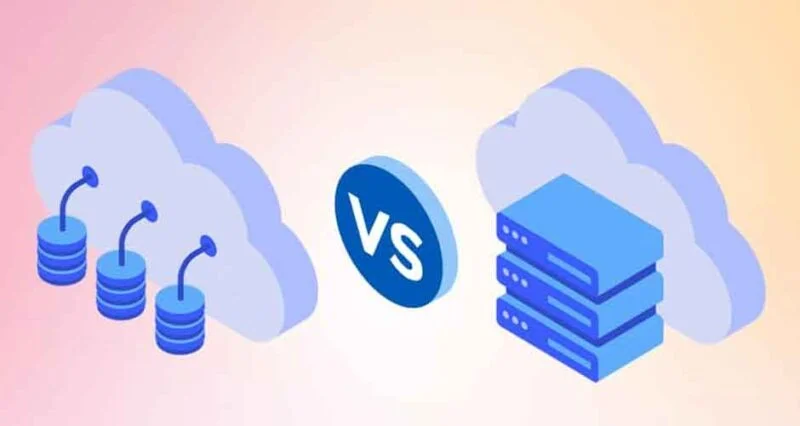
With its unparalleled convenience and cost-effectiveness, the cloud has swiftly revolutionized the modern world. In this digital transformation era, businesses must seek the most optimal software and services for their tech stacks. Cloud-based tools such as cloud computing and storage are pivotal components for numerous organizations.
Despite the frequent interchangeability of the terms “cloud storage” and “cloud computing,” it is imperative to recognize that they represent distinct concepts. Cloud storage and cloud computing are mutually indispensable. Transferring data to the cloud is essential for accessing cloud computing services, while cloud computing facilitates the utilization and manipulation of stored data in the cloud environment. Cloud Services Nashville experts help businesses to choose the right cloud model.
This article will explore the difference between cloud computing and cloud storage to choose the best one for your business.
Difference Between Cloud Storage and Cloud Computing
-
Functionality
It’s essential to consider their functionality when it comes to understanding the difference between cloud storage and cloud computing. Cloud storage is storing data in a remote server that can be accessed online. It allows users to store and retrieve files from any device with an internet connection.
On the other hand, cloud computing involves using remote servers to process and manage data, applications, and services. It allows users to access and operate software, platforms, or infrastructure without local installations or maintenance. In simple terms, cloud storage primarily focuses on storing and retrieving data, while cloud computing involves using remote servers to process and manage various resources.
-
Pricing Models
When it comes to pricing models, there are some key differences between cloud storage vs cloud computing. Cloud storage typically operates on a pay-as-you-go model, where users pay for the storage they need and use. This can be advantageous for businesses who have fluctuating storage needs, as they only pay for what they use.
On the other hand, cloud computing often operates on a more complex pricing structure. It can involve factors such as the number of virtual machines used, the amount of data processed, and the level of computational power required. This can make pricing for cloud computing services more variable and dependent on specific usage requirements. Understanding these pricing models is essential in determining the most cost-effective cloud service.
-
Performance and Speed
Performance and speed are crucial factors to consider when comparing cloud storage and computing. Cloud storage primarily focuses on providing a secure and scalable platform for storing and accessing data. The emphasis is on reliability, availability, and ease of data management.
On the other hand, cloud computing involves utilizing virtualized resources such as servers, networks, and software applications to deliver computing power on demand. Performance and speed in cloud computing depend on factors such as the capabilities of the virtualized resources, network connectivity, and the efficiency of the cloud infrastructure. While cloud storage in cloud computing plays a vital role in leveraging the benefits of the cloud, it is essential to understand their distinct characteristics when considering performance and speed requirements for your specific business needs.
-
Management and Maintenance
One key difference between cloud computing and cloud storage is their management and maintenance. Cloud storage primarily focuses on providing a secure and scalable platform for storing and accessing data. It involves using remote servers to store data, which can be accessed from anywhere with an internet connection. Cloud storage management typically involves tasks such as data backup, data replication, and ensuring data security.
On the other hand, cloud computing goes beyond just storage and includes providing various computing resources over the internet. This includes processing power, memory, virtual machines, and software applications. Cloud computing providers manage and maintain the infrastructure required to deliver these resources to users. While cloud storage focuses on data storage and accessibility, cloud computing encompasses a broader range of services that go beyond storage and include computing resources.
-
Security and Compliance
When it comes to security and compliance, there are key differences between cloud storage vs cloud computing. Cloud storage primarily focuses on securely storing and accessing data in the cloud. It offers encryption and access controls to protect data from unauthorized access. On the other hand, cloud computing involves running applications and processing tasks in the cloud.
While cloud providers also implement security measures for cloud computing, there may be additional considerations due to running applications and executing code remotely. Compliance requirements can also vary depending on the specific industry or region, so organizations must understand their obligations and ensure that their chosen cloud services meet those requirements. Whether you are considering cloud storage or cloud computing, it is essential to assess the security and compliance features offered by your provider to ensure that your data and applications remain protected.
-
Scalability and Flexibility
Cloud storage refers to storing data on remote servers, allowing users to access their files from any device with an internet connection. It provides scalability by allowing users to quickly increase or decrease their storage capacity based on their needs. This flexibility will enable businesses to adapt to changing storage requirements without needing physical hardware upgrades.
On the other hand, cloud computing involves using remote servers to process and analyze data, run applications, and perform computational tasks. It offers scalability by enabling users to scale up or down their computing resources as needed quickly. This flexibility allows businesses to handle peak workloads efficiently without investing in additional infrastructure. While both cloud storage and cloud computing offer scalability and flexibility, it is essential to understand the specific requirements of your business to choose the right solution.
Conclusion
While cloud storage and computing are integral components of cloud technology, they serve distinct purposes. Cloud storage primarily focuses on storing data remotely, providing scalability, accessibility, and redundancy. On the other hand, cloud computing encompasses a broader range of services, including virtualized computing resources, networking, and software applications, enabling users to leverage computing power without needing physical infrastructure. Understanding these differences is essential for businesses looking to utilize cloud technology effectively to meet their needs. To get more insights, visit Managed IT Services Red Bank for assistance.

